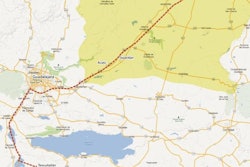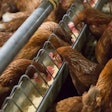I have commented on the statements of Rick Berman, president of the public relations firm Berman and Company, which among other things runs Humane Watch, as recently as last month, but he made some recent assertions that require a response. In a website commentary Berman called the United Egg Producers' president, Chad Gregory, “the industry Neville Chamberlain.” Berman wrote, “Chamberlain, over the warnings of some in Parliament, met with Hitler and claimed to have secured ‘peace in our time’ with the Fuhrer—but instead was given a worthless ruse. Gregory finds himself in a comparable situation. Plenty of people told him not to trust HSUS, but he didn’t listen.”
Berman’s proof of the untrustworthiness of the Human Society of the United States is the organization’s financial investments in firms that are developing and marketing animal protein substitutes, such as Beyond Eggs. He cites these investments as being duplicitous, because instead of just advocating for better care for animals used in agriculture, the Human Society of the United States is investing in replacements for the animals. I disagree with Berman on this point. I actually think that the Human Society of the United State's investments in these animal product substitutes are some of the most honest things they use their money for. In short, the Human Society of the United States is putting its money where its mouth is, and when these products come to market, consumers can make their choices with their dollars. I am not predicting that they will succeed, but the market will decide.
I also disagree with Berman’s analogy where Chad Gregory plays the role of Neville Chamberlain. I suppose that Berman sees the laying hen welfare agreement between the United Egg Producers and the Human Society of the United States codified as the Egg Bill as the equivalent to France and Great Britain signing the Munich agreement with Nazi Germany, allowing Germany to annex the Sudeten region of Czechoslovakia. This analogy fails on several levels.
In the Munich agreement, the governments of Britain and France agreed to let Germany occupy a portion of Czechoslovakia without consent of the Czech government and without a shot being fired. It has become a classic argument against attempts at appeasing aggression.
The Human Society of the United States and the United Egg Producers have already been at war for years. United Egg Producers has lost ballot initiatives in important egg producing states like California, Michigan and Ohio. United Egg Producers has also tried a voluntary welfare plan for egg production, and its members have been sued because of it. Just this week, Cal-Maine Foods announced a $28 million settlement in the case that alleged that egg producers gave hens more cage space as a means of manipulating egg prices not providing better living conditions for the birds.
The Egg Bill preserves the use of cages with a transition to fully-enriched colony cages. Enriched cages provide better bird welfare than other options and maintain the bird health and performance advantages of cages while being more economical and environmentally friendly than cage-free alternatives. If Berman insists on using a historical analogy for the Egg Bill, then I might suggest the Korean Armistice Agreement, which ended the fighting in Korea in July of 1953. That conflict isn’t officially over, but shots aren’t being fired and both sides remain battle-ready on either side of the demilitarized zone.
Passage of the Egg Bill likely won’t end all conflict between animal rights groups and egg producers in the U.S., but it places egg producers in a defensible position with a workable transition period during which the marketplace will decide how many cage-free, free-range or cage produced eggs it wants. I have a question for all those in animal agriculture that want egg producers to just keep on fighting and not to “negotiate with the enemy”: Where were you and your wallets when egg producers were fighting ballot initiatives? Do others in animal agriculture really care about the fate of egg producers, or do they just want egg producers to keep drawing fire from the animal rights groups? Egg producers are tired of being human shields.



















